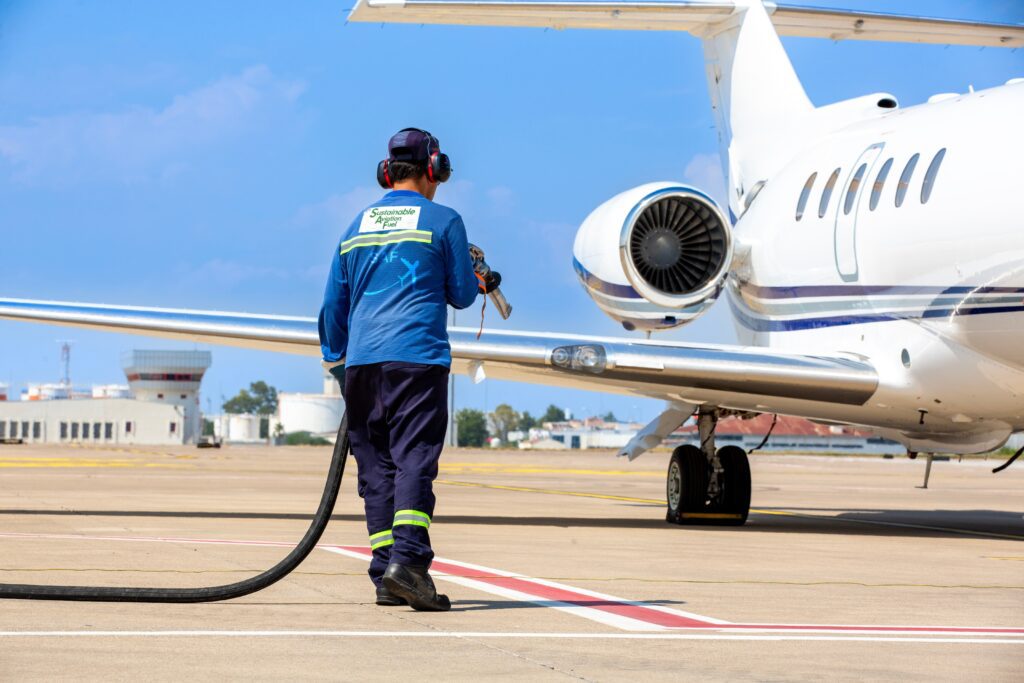OXCCU, the Oxford University spin-out developing breakthrough technology to turn waste carbon into jet fuel, has raised $28 million (£20.75m) in an oversubscribed Series B funding round backed by some of the biggest names in aviation and energy.
The round attracted new investors including Orlen VC, Safran Corporate Ventures and IAGi Ventures — the corporate venturing arm of International Airlines Group — alongside Hostplus and TCVC. They join existing backers such as Clean Energy Ventures, Aramco Ventures, Eni Next, IP Group/Kiko Ventures, and the University of Oxford.
The funding will accelerate the commercialisation of OXCCU’s single-step sustainable aviation fuel (SAF) process, expand operations, and advance its technology scale-up following the opening of its OX1 demonstration plant at London Oxford Airport last year. A second plant, OX2, is under construction and due to be operational in 2026.
The investment comes as governments push airlines towards greener fuels under mandates such as the UK’s SAF mandate and the EU’s ReFuelEU rules. However, high production costs remain a stumbling block. OXCCU’s technology is designed to break through that barrier.
Unlike conventional multi-stage processes, its patented iron-based catalyst synthesises jet fuel-range hydrocarbons directly from waste carbon dioxide, carbon monoxide and hydrogen in a single exothermic reaction. This cuts out costly intermediate steps such as methanol production, lowers capital and operating costs, and reduces the carbon intensity of the fuel. The catalyst also offers flexibility by handling different feedstocks, from reformed biogas to gasified wood waste.
“This raise is a testament to the strength of our science, the clarity of our mission, and the urgency of the problem we’re solving,” said Andrew Symes, OXCCU’s chief executive. “What we’re seeing is that serious players with truly distinctive technologies are still getting funded.”
Industry leaders investing in the round framed OXCCU’s innovation as critical to hitting net zero targets.
Jonathon Counsell, group sustainability director at IAG, said the company’s commitment to using 10% SAF by 2030 would be supported by “developing new partnerships to produce next-generation fuels.”
Orlen chief executive Ireneusz Fąfara described the technology as central to his group’s strategy of becoming a leading European SAF producer by 2035, while Safran chief sustainability officer Nathalie Stubler said the company’s involvement was part of “de-risking and industrial scale-up of the most promising sustainable aviation fuel technologies.”
For investors, OXCCU’s rapid progress has been a major draw. In just a few years the company has advanced from lab research to operating a demonstration plant. Daniel Goldman, co-founder of Clean Energy Ventures, said the team was “reshaping the sustainable aviation fuel market, unlocking the affordability aviation needs to decarbonise.”
Dr Robert Trezona of IP Group added: “This round is a significant milestone, not just for the company, but for the sector — established industry actors are putting significant capital to work on a credible path to decarbonise aviation. OXCCU showcases the UK’s ability to lead in climate innovation.”
While aviation is the immediate focus, OXCCU’s platform could also be applied to chemicals and plastics. For Symes, the funding marks a pivotal moment: “Aviation needs a solution, and the serious lever is SAF. The challenge is cost — and that’s exactly what we are addressing.”


